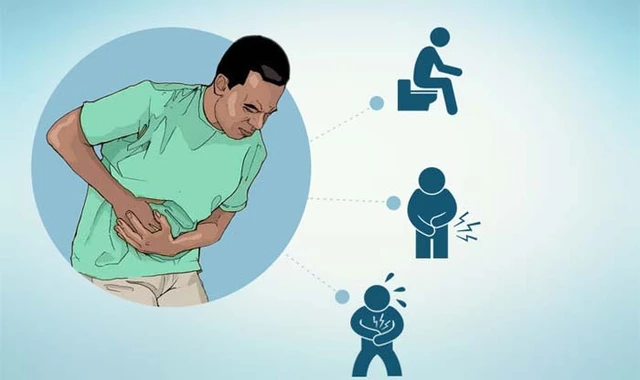Understanding Gonorrhea: A Brief Overview
Gonorrhea is a common sexually transmitted infection (STI) caused by the bacterium Neisseria gonorrhoeae. It can affect both men and women and is transmitted through various forms of sexual contact, including oral sex. In this article, we will discuss what you need to know about gonorrhea and its relationship with oral sex, including symptoms, prevention methods, and treatment options. Let's first take a look at the basics of this STI and how it spreads.
The Connection Between Gonorrhea and Oral Sex
Oral sex, which involves using the mouth to stimulate the genitals, is a common sexual activity among people of all ages and orientations. However, many people are unaware that oral sex can transmit gonorrhea. The bacteria that cause gonorrhea can be found in the genitals, rectum, and throat of infected individuals, and can be easily passed on to sexual partners through oral sex.
When engaging in oral sex with an infected person, the bacteria can be transmitted from the genitals to the throat, or vice versa. It is important to keep in mind that gonorrhea can be transmitted even if no symptoms are present, making it crucial to practice safe sex and get regularly tested for STIs.
Recognizing the Symptoms of Oral Gonorrhea
Oral gonorrhea often goes unnoticed, as many people who contract it do not experience any symptoms. This can make it difficult to detect and treat the infection, leading to a higher risk of transmission to others. However, some individuals may develop symptoms, which can include:
- Sore throat
- Difficulty swallowing
- Red and swollen tonsils
- White or yellow discharge from the throat
- Swollen lymph nodes in the neck
If you experience any of these symptoms after engaging in oral sex, it is crucial to get tested for gonorrhea and other STIs to ensure proper treatment and prevent transmission to others.
Preventing Gonorrhea Transmission During Oral Sex
While abstinence from oral sex is the only guaranteed way to prevent the transmission of gonorrhea, there are several other methods that can significantly reduce the risk, including:
- Using barrier protection: Using condoms or dental dams during oral sex can help prevent the spread of gonorrhea and other STIs.
- Communicate with your partner: Discuss your sexual history and STI status with your partner before engaging in oral sex. Ensure that both you and your partner have been tested for STIs.
- Limit your number of sexual partners: Having fewer sexual partners can decrease your risk of contracting gonorrhea and other STIs.
- Get regularly tested: Regular STI testing can help detect infections early and prevent the spread of gonorrhea to others.
By taking these precautions, you can enjoy a healthy and fulfilling sex life while minimizing the risk of gonorrhea transmission.
Diagnosis and Treatment of Oral Gonorrhea
If you suspect that you may have contracted oral gonorrhea, it is essential to get tested as soon as possible. A healthcare provider can diagnose gonorrhea through a simple throat swab, which is then sent to a laboratory for confirmation. Early detection and treatment are crucial in preventing complications and the spread of the infection to others.
The standard treatment for gonorrhea involves a course of antibiotics, usually a single dose of ceftriaxone, often combined with azithromycin. It is important to take the prescribed medications as directed and to abstain from oral, anal, and vaginal sex until the infection has been fully treated. Additionally, it is essential to inform your sexual partners about your diagnosis so they can also be tested and treated if necessary.
Long-Term Effects and Complications of Untreated Gonorrhea
Left untreated, gonorrhea can cause serious complications and long-term health problems. In the throat, an untreated gonorrhea infection can lead to abscesses, chronic sore throat, and the spread of the infection to other parts of the body.
Untreated gonorrhea can also increase the risk of contracting other STIs, such as HIV. In women, the infection can spread to the reproductive organs and cause pelvic inflammatory disease (PID), which can lead to chronic pain, infertility, and ectopic pregnancy. In men, untreated gonorrhea can cause inflammation of the epididymis, leading to pain, fever, and in some cases, infertility.
These potential complications highlight the importance of early detection, treatment, and prevention of gonorrhea, including practicing safe oral sex and getting regularly tested for STIs.





Nathan Squire
It's great that you're reading up on gonorrhea and oral sex-knowledge is the first line of defense.
Many people assume oral sex is risk‑free, which is a delightful misconception.
The bacterium Neisseria gonorrhoeae can indeed colonize the throat just as it does the genitals.
Asymptomatic carriage is common, so you can't rely on your throat feeling fine to rule out infection.
Typical symptoms, when they appear, include a sore throat, swollen lymph nodes, or unusual discharge.
If you notice any of these after a night of fun, get tested promptly.
Testing is simple: a throat swab sent to a lab will confirm the presence of the pathogen.
Early detection allows for a single dose of ceftriaxone, often combined with azithromycin, to clear the infection.
Remember to abstain from oral, anal, and vaginal activity until the prescribed course is complete.
Barrier methods like condoms and dental dams dramatically reduce transmission risk.
Communicating your STI status with partners is not just courteous-it’s essential public health practice.
Limiting the number of sexual partners also lowers your exposure probability.
Regular screening, at least annually for sexually active individuals, catches infections before complications arise.
Untreated gonorrhea can lead to severe issues such as pelvic inflammatory disease in women or epididymitis in men.
So, enjoy your sex life, but do it responsibly and stay informed.
satish kumar
While the article does a commendable job outlining the basics of Neisseria gonorrhoeae transmission, one must note the occasional oversight regarding the specificity of antimicrobial stewardship; indeed, the recommendation of a single dose of ceftriaxone-though standard-should be accompanied by a discussion of regional resistance patterns, which vary considerably across locales, thereby influencing therapeutic efficacy.
Matthew Marshall
Drama aside, oral gonorrhea is a silent killer.
Lexi Benson
Oh, because ignoring the throat completely will magically make the bacteria disappear-sarcasm aside, it's crucial to treat the mouth like any other entry point.
Vera REA
From a cultural standpoint, many societies still view oral intimacy as a low‑risk activity, which can hinder public health messaging. Recognizing these perceptions helps tailor education campaigns that respect traditions while promoting safe practices.
John Moore
Let's keep the conversation constructive: everyone can benefit from using barriers, getting tested regularly, and discussing results openly. This approach reduces stigma and fosters a healthier community.
Adam Craddock
Could you elaborate on the recommended frequency of screening for individuals with multiple partners, and whether rapid point‑of‑care tests are reliable for throat specimens?
Kimberly Dierkhising
Building on John’s point, it’s vital to incorporate terminology like “asymptomatic pharyngeal colonization” and “antimicrobial susceptibility profiling” into patient counseling; this demystifies the clinical process and empowers informed decision‑making.
Rich Martin
Philosophically speaking, if we consider the mouth a gateway, then neglecting its protection is like leaving your front door wide open while claiming safety. Use that dental dam, folks.
Buddy Sloan
Totally agree with Rich-protecting every entry point makes sense. 👍 Stay safe, everyone!
SHIVA DALAI
In a grand theatrical sense, the silent spread of gonorrhea through oral routes demands a spotlight on prevention; let us raise the curtain on regular testing and barrier usage with the solemnity it deserves.